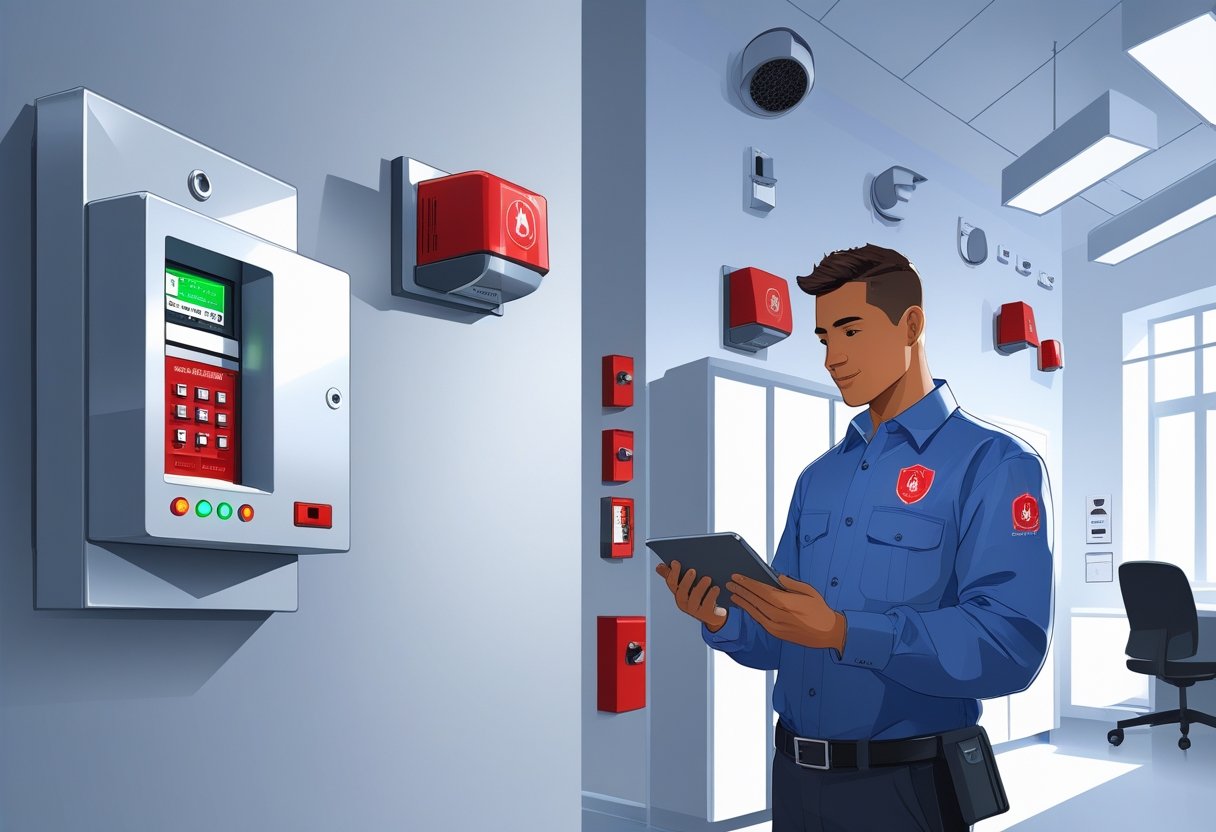When searching for reliable fire alarm system companies near you, it’s crucial to understand the services available in your area, particularly if you are located in the greater Houston area. These companies specialize in designing, installing, and maintaining fire alarm systems that ensure your safety and compliance with local regulations. Locating a trusted provider who understands the specific needs of your facility can make all the difference in fire protection.
Fire alarm systems are not just essential for compliance but are vital for protecting lives and property. Companies in the greater Houston area offer a range of services, from installation to ongoing maintenance and monitoring, tailored to your specific requirements. Selecting the right provider can ensure that you receive a system that meets all municipal fire codes while providing peace of mind for your safety.
In the following sections, you will discover a list of reputable fire alarm system companies in the greater Houston area. These companies have extensive experience and a proven track record of delivering quality service to meet your fire safety needs. By working with local professionals, you can ensure that your fire alarm system is designed and maintained to the highest standards.
How to Find the Best Fire Alarm System Companies Near Me
Finding a reliable fire alarm system company requires careful evaluation of several key factors. Focus on company reputation, necessary certifications, and the range of services offered to ensure you choose the right partner for your fire safety needs.
Evaluating Company Reputation and Experience
Researching the reputation of fire alarm companies is crucial. Look for companies with a strong presence in the greater Houston area, such as AFA Protective Systems, known for its exemplary service.
Start by checking online reviews and testimonials. Websites like Yelp or Google Reviews provide insights from previous customers. Pay attention to overall ratings and specific comments about reliability, responsiveness, and customer service.
Moreover, consider how long the company has been in business. A well-established firm is more likely to have the expertise needed to handle your fire alarm installation and maintenance effectively.
Important Certifications and Code Compliance
Ensure the fire alarm company you choose complies with relevant codes and standards. Look for certifications such as NICET (National Institute for Certification in Engineering Technologies), which demonstrates expertise in fire alarm systems.
Additionally, check if the company follows NFPA (National Fire Protection Association) guidelines. Compliance with these codes guarantees that installations are safe and effective, reducing the risk of fire hazards in your home or business.
A certified company will also be familiar with local regulations specific to the greater Houston area. This knowledge ensures that your fire alarm system meets all legal requirements and provides peace of mind.
Comparing Service Offerings and Support
Examine the services offered by different fire alarm companies. Focus on companies that provide a comprehensive range of services, including installation, maintenance, and monitoring.
For instance, AFA Protective Systems offers complete fire alarm solutions. They handle everything from initial assessments to ongoing system maintenance. This full-service approach helps you manage your fire safety needs more effectively.
Check if the companies provide 24/7 support. Quick response times are essential during emergencies. Make sure to ask about warranties and after-sales support, as these can significantly impact the overall value of your service.
Fire Alarm System Services Offered by Local Companies
Local fire alarm system companies in the greater Houston area provide a range of essential services tailored to enhance safety in both residential and commercial settings. These services cover everything from the initial design of fire alarm systems to ongoing monitoring solutions, ensuring comprehensive protection against fire hazards.
Design and Engineering Solutions
When you start considering a fire alarm system, professional design and engineering solutions are critical. Local companies assess your specific needs, identifying potential risks in your property layout. They create customized fire alarm designs that comply with relevant codes and regulations.
This stage often includes detailed engineering plans outlining the placement of devices such as smoke detectors, alarms, and control panels. By utilizing advanced technology, they can simulate fire scenarios to ensure optimal performance. Engaging experts in this phase helps guarantee that your system meets life safety requirements and functions effectively in an emergency.
Fire Alarm System Installation Services
Fire alarm installation services are a cornerstone of what local companies offer. Skilled technicians manage the complete installation of fire alarm systems, ensuring that all components are correctly placed and connected. This process includes wiring, mounting devices, and configuring the system for immediate operation.
Each installation typically follows strict guidelines and safety regulations. Technicians perform thorough testing post-installation to verify that the system functions as intended. You can also expect user training, allowing you to operate the system confidently and understand its features.
System Upgrades for New Construction and Existing Buildings
For new construction, integrating modern fire alarm systems is vital for ensuring compliance and safety from the outset. Local companies can design systems that seamlessly integrate into the architectural framework, providing comprehensive coverage.
If you're upgrading an existing system, these experts assess your current setup and recommend enhancements that improve functionality. This might include adding advanced features such as wireless connectivity or updated detectors. Upgrading can enhance safety and ensure your systems remain compliant with evolving regulations.
Central Station Monitoring and Life Safety Services
Central station monitoring is an essential offering that enhances your fire alarm system's effectiveness. Local companies provide 24/7 monitoring services, ensuring any fire alarm activation is promptly addressed. This service can be vital for minimizing property damage and ensuring rapid response by emergency services.
Life safety services extend beyond the basic alarm system. They often include routine inspections, maintenance, and testing to ensure all components work correctly. Regular maintenance can prevent system failures and help you meet safety standards. Engaging these services means you can have peace of mind, knowing your property is monitored continuously for fire safety.
Ongoing Maintenance and Inspection for Fire Alarm Systems
Maintaining and inspecting your fire alarm system is crucial for keeping it operational and compliant with safety regulations. Regular upkeep ensures that your system functions properly when needed most.
Scheduled Maintenance Programs
Scheduled maintenance programs are essential for ensuring that your fire alarm system operates correctly throughout the year. These programs typically include regular inspections, testing of components, and any necessary repairs.
You can expect certified technicians to check important elements such as alarm panels, smoke detectors, and wiring connections. Having a maintenance program in place helps prevent system failures and is often a requirement for insurance policies.
Many companies offer various plans to suit different types of structures, including commercial and residential buildings. Regular maintenance minimizes downtime and maximizes the reliability of your fire alarm system.
Annual Fire Alarm Inspections
Annual fire alarm inspections are often mandated by local codes and insurance requirements. During these inspections, a detailed evaluation of your system takes place, focusing on functionality and reliability.
Inspection services typically include testing alarm signals, verifying the operational status of emergency power systems, and ensuring all components meet required standards. After each inspection, you will receive a report outlining the condition of your system and any necessary corrective measures.
Skilled inspectors can help identify potential issues before they become serious problems. Keeping up with these inspections not only safeguards lives but ensures compliance with regulations specific to the greater Houston area.
Code Compliance Inspections and Documentation
Code compliance inspections are vital for upholding local and national safety standards. These inspections verify that your fire alarm system meets all necessary regulations and that you have the required documentation in place.
You will want to keep detailed records of all inspections, maintenance, and repairs for your fire alarm system. This documentation not only proves compliance but can also be crucial during audits or insurance claims.
Working with a knowledgeable provider will ensure that you stay up-to-date with any changes in fire code regulations. Regular compliance checks help protect your property and ensure that your fire alarm system is always ready to respond in an emergency.
Essential Components of a Modern Fire Alarm System
A modern fire alarm system consists of various critical components that work together to ensure safety and prompt response in emergencies. Understanding these elements is essential for making informed decisions when selecting services or products.
Fire Alarm Control Panels and Interface Devices
The fire alarm panel serves as the brain of the system. It receives signals from various devices, processes this information, and activates alarms or notifications as needed. Typically, a well-designed fire alarm control panel features:
- A user-friendly interface for monitoring system status
- Real-time notifications for system failures
- Integration with other building systems, enhancing overall safety
Interface devices allow users to interact with the panel effectively. Whether through touch screens or traditional buttons, these devices provide essential feedback, allowing you to assess the system’s readiness and functionality. Frequent testing of the panel helps ensure that all connected devices function correctly.
Initiating Devices: Pull Stations and Smoke Detectors
Initiating devices are crucial for alerting you and others in the building to potential fire hazards.
Pull stations allow occupants to manually trigger the alarm in case of smoke or fire. They are strategically placed at exits and high-traffic areas to ensure accessibility.
Smoke detectors use various technologies like photoelectric or ionization sensors to identify smoke particles. Reliable smoke detectors can detect threats early, which is vital for effective evacuation. Regular maintenance and testing of these devices help reduce false alarms while ensuring their reliability.
Notification Appliances and Battery Backup
Notification appliances are essential for alerting building occupants during an emergency. These may include:
- Audible alarms: Loud sounds designed to be heard over ambient noise
- Visual alarms: Flashing lights or strobe signals that alert those with hearing impairments
Battery backup is equally crucial. In the event of a power failure, your fire alarm system must remain operational. High-quality fire alarm designs incorporate backup batteries that provide sufficient power to maintain functionality until normal power is restored. Regular checks and maintenance of these batteries can prevent system failures during critical moments.
Integrated Fire Protection and Security Solutions
When selecting integrated fire protection and security solutions, it’s essential to consider effective systems tailored to meet your specific needs. Here’s a detailed look at fire suppression and fire protection systems, as well as access control and security integration, focused on services available in the greater Houston area.
Fire Suppression and Fire Protection Systems
Fire suppression systems are critical. They are designed to detect and extinguish fires quickly to protect lives and property. In the greater Houston area, you can choose from various options, including:
- Sprinkler Systems: Automatically activated by heat, these systems help extinguish fires before they spread.
- Fire Alarms: These alert occupants and emergency services, ensuring quick responses.
- Fire Extinguishers: Portable and easy to use, they are essential in every building.
Implementing a comprehensive fire protection system ensures compliance with local codes and enhances safety. Regular maintenance and inspections also play a vital role in their effectiveness.
Access Control and Security Integration
Access control systems are crucial for managing entry into your building. These systems help you monitor who enters and exits, providing an additional layer of security. In the Houston area, consider options such as:
- Key Card Access: Convenient and customizable, allowing specific access rights.
- Biometric Scanners: Utilize fingerprints or facial recognition for high-security areas.
- Surveillance Systems: Cameras and video monitoring support crime prevention and provide insights.
Integrating access control with fire protection systems ensures a cohesive approach to safety. It streamlines emergency responses while enhancing overall security resources within your facility.
Choosing Qualified Fire Alarm Technicians and Professionals
Selecting the right fire alarm technicians is crucial for ensuring the safety and reliability of your fire alarm systems. Understanding their training, certifications, and roles can help you make informed decisions.
Training and Certification Requirements
When hiring a fire alarm technician, it is essential to verify their training and certifications. Technicians should be certified by recognized organizations, such as the National Institute for Certification in Engineering Technologies (NICET).
Look for individuals who have completed training programs that cover fire alarm system design, installation, and maintenance. Ensure they have experience with local codes and regulations, which can vary by location.
In the greater Houston area, many qualified technicians possess specific Texas state licenses. Confirming these credentials ensures that your technician is knowledgeable about both national standards and local requirements.
The Role of Technicians in System Reliability
Fire alarm technicians play a critical role in maintaining system reliability and effectiveness. They are responsible for the installation, testing, and regular maintenance of your fire alarm systems.
A skilled technician performs thorough inspections, identifies potential hazards, and implements corrective actions. Regular testing by qualified professionals ensures that alarms will function correctly in an emergency, potentially saving lives.
Additionally, technicians often provide valuable guidance on compliance with fire safety regulations. This proactive approach helps you stay informed about any necessary upgrades or repairs, ensuring your systems are always up to date and ready when needed.
Frequently Asked Questions
When selecting a fire alarm system company, several factors are critical to ensure you receive quality service and equipment. Understanding certifications, support services, and customization options will help you make an informed decision that meets your specific needs.
What are the key factors to consider when choosing a fire alarm system company?
Consider the company's experience and reputation in the greater Houston area. Look for local companies with positive reviews and a solid track record of successful installations.
Evaluate the range of services they offer, including design, installation, monitoring, and maintenance. This ensures you have comprehensive support throughout the lifecycle of your fire alarm system.
How do I verify the certifications and qualifications of a fire alarm system company?
Check for industry certifications such as those from the National Fire Protection Association (NFPA) or Underwriters Laboratories (UL). These certifications indicate that the company meets established standards for fire safety.
Ask about the qualifications of their technicians. Ensure they have the appropriate training and licenses to perform installations and inspections in Texas.
What maintenance and support services do fire alarm system companies offer after installation?
Most companies provide ongoing maintenance services, which can include regular inspections, testing, and repairs. These services are crucial to ensure your system remains functional and compliant with local regulations.
Inquire about their response times for service calls and whether they offer 24/7 monitoring services for added peace of mind.
How often should fire alarm systems be inspected and tested by a professional company?
Fire alarm systems should be inspected at least once a year to ensure they are working correctly. Regular testing helps identify any potential issues before they become significant problems.
Some local regulations may require more frequent inspections, especially in commercial properties. Always check with your fire alarm company for specific guidelines relevant to your location.
Can fire alarm system companies provide customized solutions for unique building requirements?
Yes, many companies in the greater Houston area offer customized solutions tailored to your building's layout and fire safety needs.
They can assess your specific requirements and recommend the best system design, including the types and placements of detectors and alarms.
What is the process for updating or upgrading an existing fire alarm system through a professional company?
The process typically begins with a thorough assessment of your current system. A professional company will evaluate its effectiveness and identify areas for improvement.
Based on their findings, they will recommend upgrades or replacements to enhance the system's performance or expand its capabilities to meet your current needs.
.svg)



.svg)


.svg)



